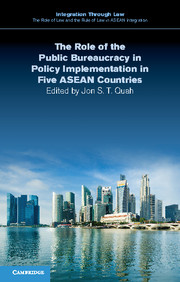Book contents
- Frontmatter
- Contents
- List of tables
- List of contributors
- General editors’ preface
- Preface
- 1 The role of the public bureaucracy in policy implementation in five ASEAN countries: a comparative overview
- 2 Weak central authority and fragmented bureaucracy: a study of policy implementation in Indonesia
- 3 The public bureaucracy's role in policy implementation in Malaysia
- 4 Dysfunctional bureaucracy, corruption and weak rule of law: a case study of policy implementation in the Philippines
- 5 Governance and meritocracy: a study of policy implementation in Singapore
- 6 Vietnam's public bureaucracy and implementation of two ASEAN policies
- 7 Policy implementation in ASEAN and the European Union: the problem of asymmetric compliance
- Executive summary
- Index
- References
5 - Governance and meritocracy: a study of policy implementation in Singapore
Published online by Cambridge University Press: 05 February 2016
- Frontmatter
- Contents
- List of tables
- List of contributors
- General editors’ preface
- Preface
- 1 The role of the public bureaucracy in policy implementation in five ASEAN countries: a comparative overview
- 2 Weak central authority and fragmented bureaucracy: a study of policy implementation in Indonesia
- 3 The public bureaucracy's role in policy implementation in Malaysia
- 4 Dysfunctional bureaucracy, corruption and weak rule of law: a case study of policy implementation in the Philippines
- 5 Governance and meritocracy: a study of policy implementation in Singapore
- 6 Vietnam's public bureaucracy and implementation of two ASEAN policies
- 7 Policy implementation in ASEAN and the European Union: the problem of asymmetric compliance
- Executive summary
- Index
- References
Summary
Introduction
Over the years, Singapore's public bureaucracy (comprising the civil service and statutory boards) has been recognized for its professionalism and integrity, and for its pivotal role in promoting the country's socio-economic development, which has enhanced Singapore's reputation for high standards of governance and administration.
The country has been awarded high percentile rankings for five of the World Bank's governance indicators for 2013: government effectiveness (99.5), political stability and absence of violence/terrorism (95.7), control of corruption (96.7), regulatory quality (100) and rule of law (95.3) (World Bank 2014). These rankings are corroborated by the high global rankings (often within the first three) on other governance indicators in the World Economic Forum's Global Competiveness Reports, the World Bank's Doing Business surveys and Transparency International's Corruption Perceptions Index (CPI). Critics of Singapore have argued that such achievements have been won at the expense of individual freedom and open democracy. In fact, the only governance indicator used by the World Bank for which Singapore does not have a high percentile rank is voice and accountability (52.1, in 2013), due in part to controls over the press and broadcast media (World Bank 2014). However, this indicator has not taken into account the complexity and shifting nature of Singapore's political culture in recent years.
This chapter is in two parts. The first part examines policy implementation in Singapore as a key factor in its achievement of a high standard of governance. It focuses on the essential features of policy implementation in Singapore by adopting the framework developed by Van Meter and Van Horn (1975: 462–74). To facilitate the understanding of policy implementation in Singapore, this part analyses the policy context, the profile of the public bureaucracy, the main characteristics of policy formulation, and provides three policy recommendations to address its limitations. The second part of the chapter deals with the implementation of these two ASEAN policies by the public bureaucracy in Singapore: the ASEAN Cosmetic Directive (ACD) of 2003 and the ASEAN Declaration on Transnational Crime of 1997, administered by the ASEAN Ministerial Meeting on Transnational Crime (AMMTC) and the Senior Officials Meeting on Transnational Crime (SOMTC).
Policy context
This section describes the context which influences how policy is implemented in Singapore by identifying important aspects of its geography, history, society, economy, public finances and the political and legal system.
- Type
- Chapter
- Information
- Publisher: Cambridge University PressPrint publication year: 2016
References
- 10
- Cited by

